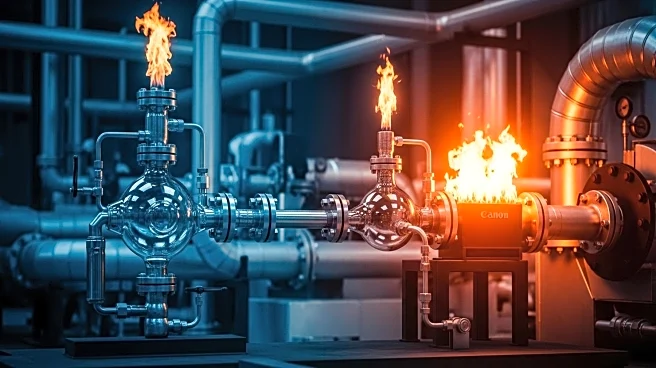What is the story about?
What's Happening?
China's chemicals industry is transitioning from oil-based to coal-based feedstocks, driven by resource availability, cost dynamics, and policy incentives. This shift is economically compelling due to China's abundant coal reserves, which account for 94% of its fossil energy resources. Coal-based feedstocks dominate methanol, ammonia, and PVC production, offering lower production costs compared to oil-based alternatives. The cost structure of coal-to-chemicals is heavily influenced by feedstock prices, which account for over 60% of total production costs. This transition is also a strategic move to enhance energy security, reducing dependence on volatile global oil markets by converting domestic coal into synthetic fuels and chemicals.
Why It's Important?
The shift to coal-based feedstocks in China's chemicals industry has significant implications for global energy markets and environmental sustainability. While it offers cost advantages and energy security, it raises concerns about carbon emissions and environmental impact. Coal-to-chemicals is a carbon-intensive sector, conflicting with China's climate goals of peaking emissions before 2030 and achieving carbon neutrality by 2060. The industry's expansion could add to China's CO2 emissions, challenging its climate commitments. Investors must navigate the balance between economic benefits and environmental responsibilities, considering technological innovations that could mitigate carbon footprints.
What's Next?
The future of China's coal-to-chemicals industry depends on balancing cost advantages with decarbonization efforts. Technological innovations, such as integrating green hydrogen and carbon capture and storage, could reduce emissions and improve efficiency. However, these solutions face challenges in scalability and cost. Policy shifts, including stricter emissions targets or carbon pricing mechanisms, could impact the industry's cost edge. Investors need to monitor potential regulatory changes and the adoption of low-carbon alternatives, which could accelerate the transition to more sustainable chemical production methods.
Beyond the Headlines
The coal-to-chemicals industry's expansion highlights broader ethical and environmental concerns. The reliance on coal raises questions about long-term sustainability and the impact on global climate change efforts. The industry's growth in coal-rich regions provides economic benefits, such as employment and revenue, but also poses challenges in balancing industrial growth with environmental protection. The integration of innovative technologies could align the industry with climate goals, but requires significant investment and policy support to overcome existing barriers.















